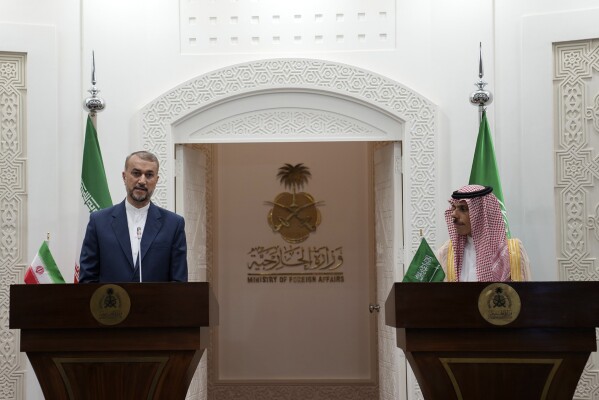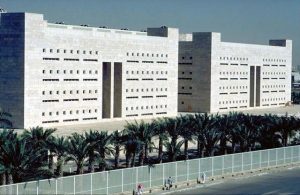Ministry of Foreign Affairs of Saudi Arabia: The ongoing conflict in Gaza has reverberated far beyond the borders of Israel and Palestine, shaking the foundations of international diplomacy and redefining regional alliances. A critical moment in this complex geopolitical landscape occurred when the Ministry of Foreign Affairs of Saudi Arabia issued a formal and forceful condemnation of statements made by Israeli Prime Minister Benjamin Netanyahu regarding the potential displacement of Palestinians from the Gaza Strip.
Ministry of Foreign Affairs of Saudi Arabia: The Historical Shadow of Displacement: The Nakba as a Permanent Wound
This was not a routine press release; it was a definitive declaration of principle. The statement from the Ministry of Foreign Affairs of Saudi Arabia served as a powerful reminder that despite ongoing normalization talks and shifting regional dynamics, certain Arab and Islamic red lines remain absolute.
The unequivocal rejection of any form of population transfer, a core tenet of the Palestinian cause, was reaffirmed with resolute clarity.
This article will delve into the profound significance of this diplomatic move, analyzing the historical context of displacement, the content of Netanyahu’s remarks, the strategic objectives behind Saudi Arabia’s condemnation, and the broader implications for the future of the Israeli-Palestinian conflict and regional stability.
To fully grasp the gravity of the Saudi condemnation, one must first understand the deep-seated historical trauma that the concept of displacement represents for the Palestinian people. The foundational event of their modern history is the Nakba, or “catastrophe,” of 1948.
This period involved the mass exodus and forced displacement of over 700,000 Palestinians from their homes and lands during the war that led to the establishment of the State of Israel.
The Nakba is not a closed chapter in a history book; it is a living, open wound that defines Palestinian identity, memory, and political aspiration.
The right of return for these refugees and their millions of descendants has been a central, non-negotiable pillar of the Palestinian national movement and a consistent point of reference in all peace negotiations, from UN General Assembly Resolution 194 to the Oslo Accords.
For decades, the fear of a second, final displacement—a complete erasure of the Palestinian presence in historic Palestine—has been the darkest nightmare of the Palestinian people.
Any rhetoric or policy suggestion that evokes this fear is therefore met with immediate and universal outrage across the Arab and Muslim world.
It is seen as a direct assault on the very existence of the Palestinian nation. When Prime Minister Netanyahu and other far-right ministers in his government began openly discussing plans for the “voluntary migration” of Gazans, they were playing with fire, knowingly or unknowingly igniting the deepest fears rooted in the trauma of the Nakba.
Netanyahu’s Provocative Statements: The Immediate Catalyst
In the weeks following the horrific October 7th attacks and the subsequent Israeli military invasion of Gaza, a disturbing narrative began to emerge from the highest levels of the Israeli government.
Prime Minister Benjamin Netanyahu, along with members of his far-right coalition such as Finance Minister Bezalel Smotrich and National Security Minister Itamar Ben-Gvir, started to publicly advocate for what they termed the “voluntary migration” of Palestinians out of the Gaza Strip.
Netanyahu’s comments were often couched in the language of humanitarianism and regional solution-seeking. He suggested that other countries should be willing to accept Gazan refugees and that this would be a positive outcome for all parties involved.
To the international community and Arab states, however, the word “voluntary” rang hollow.
The context was one of relentless bombardment, widespread destruction of civilian infrastructure, a severe humanitarian crisis limiting access to food, water, and medicine, and the internal displacement of over 80% of Gaza’s population.
In such conditions, true voluntarism is impossible; the choice to leave is made under the duress of survival.
These statements were widely interpreted as an endorsement of a long-standing goal of the Israeli far-right: the deliberate reduction of the Palestinian population in Gaza through forced transfer, thereby thwarting any possibility of a viable Palestinian state.
It was this dangerous and inflammatory rhetoric that compelled the Ministry of Foreign Affairs of Saudi Arabia to break its silence and issue a definitive response, drawing a clear line in the sand.
The Saudi Condemnation: Dissecting the Official Statement
The official statement released by the Ministry of Foreign Affairs of Saudi Arabia was a model of diplomatic language, yet its message was uncompromisingly firm. It left no room for ambiguity. The statement typically included the following key elements, which are worth dissecting:
-
Categorical Rejection: The ministry expressed its “strong condemnation and categorical rejection” of the statements made by the Israeli Prime Minister. The use of the word “categorical” is significant in diplomacy; it signifies an absolute, non-negotiable position that is not open for discussion or interpretation.
-
A Violation of International Law: The statement emphasized that such proposals constitute a “violation of international humanitarian law and international legitimacy resolutions.” This anchors the Saudi position in the established framework of global governance, lending it legal and moral authority beyond mere political disagreement. It references the Fourth Geneva Convention, which expressly prohibits the individual or mass forcible transfer of protected persons from occupied territory.
-
A Threat to Regional Security: The condemnation highlighted that such rhetoric represents a “serious threat to regional peace and security.” This frames the issue not only as a Palestinian-Israeli problem but as a potential catalyst for broader regional instability and conflict. It signals to the international community that the consequences of inaction could be severe and far-reaching.
-
Support for the Palestinian Cause: The statement reiterated the Kingdom’s “steadfast support for the Palestinian cause and the legitimate rights of the Palestinian people to self-determination and the establishment of their independent state on the 1967 borders with East Jerusalem as its capital.” This reaffirmed Saudi Arabia’s long-standing diplomatic commitment, placing the condemnation within the context of its broader foreign policy objectives.
By issuing this statement, the Ministry of Foreign Affairs of Saudi Arabia accomplished several goals at once: it upheld a core principle of Arab foreign policy, positioned the Kingdom as a defender of international law, and sent a clear warning to Israel about the limits of acceptable discourse and action.
Strategic Objectives: Why This Condemnation Matters
The decision by the Ministry of Foreign Affairs of Saudi Arabia to publicly and forcefully condemn Netanyahu was driven by a complex set of strategic, religious, and diplomatic calculations.
-
Upholding Arab and Islamic Leadership: As the custodian of Islam’s two holiest mosques, Saudi Arabia carries a weighty responsibility within the Muslim world. Remaining silent on an issue that strikes at the heart of the Palestinian cause would have severely damaged its credibility and leadership地位 (leadership status) among Arab and Islamic nations. The condemnation was necessary to maintain its position as a pivotal leader in the Islamic world.
-
Protecting the Prospects of Normalization: Paradoxically, the strong stance may also be about preserving the long-term possibility of normalization with Israel. The Saudi-led Arab Peace Initiative of 2002 offers full normalization with the Arab world in exchange for a full withdrawal to the 1967 borders and a just solution for refugees. By condemning actions that would make this outcome impossible, the Kingdom is signaling that any future normalization must be built on a foundation that includes Palestinian statehood, not its erasure. It is a demand for Israel to choose between annexation and isolation or peace and integration.
-
Domestic and Regional Legitimacy: Public opinion in Saudi Arabia and across the Arab world is overwhelmingly sympathetic to the Palestinian cause. A perceived soft stance on an issue as fundamental as displacement would be domestically unpopular and could fuel dissent. The condemnation solidifies domestic support and aligns the Kingdom with the overwhelming sentiment of its populace and neighboring states.
-
Countering Iranian Influence: Iran and its proxy network have long used the Palestinian issue as a primary tool to garner regional support and criticize rival Arab states, particularly those seeking peace with Israel. By taking a firm, principled stand against Israeli extremism, Saudi Arabia deprives Iran of a potent rhetorical weapon and demonstrates that it can champion the Palestinian cause effectively through diplomacy and international law, rather than through militant proxy warfare.
The Broader Diplomatic Context: A Coordinated Arab and International Response
The condemnation from the Ministry of Foreign Affairs of Saudi Arabia was not an isolated event. It was part of a chorus of international outrage.
Key European powers, the United Nations Secretary-General, and even the United States—Israel’s staunchest ally—expressed deep concern and opposition to the displacement rhetoric.
The U.S. State Department repeatedly stated that Washington would not support the forced relocation of Palestinians outside of Gaza.
This collective, multi-lateral pushback was crucial. It demonstrated that Netanyahu’s ideas were beyond the pale of acceptable international discourse and had no chance of gaining widespread legitimacy.
It isolated the extreme elements within the Israeli government and signaled that any attempt to operationalize such a plan would be met with severe diplomatic and potentially economic consequences.
The strong stance from a key regional power like Saudi Arabia, as articulated by its Ministry of Foreign Affairs of Saudi Arabia, lent immense weight to this international consensus and made it clear that the Arab world would not countenance a repeat of the historical trauma of 1948.
The Legal and Humanitarian Imperative
At its core, the Saudi condemnation is rooted in a defense of fundamental legal and humanitarian principles. The Fourth Geneva Convention of 1949, which governs the treatment of civilians in wartime and under occupation, is unequivocal. Article 49 states:
“Individual or mass forcible transfers, as well as deportations of protected persons from occupied territory to the territory of the Occupying Power or to that of any other country, occupied or not, are prohibited, regardless of their motive.”
Proposals for the “voluntary” transfer of Gazans, made under the conditions of a devastating siege and military assault, cannot be considered truly voluntary and thus clearly violate the spirit and letter of international law.
The Ministry of Foreign Affairs of Saudi Arabia, by invoking international law, positioned the Kingdom on the side of the global legal order and human rights.
This moves the argument beyond political conflict to a defense of a universal standard of civilian protection, a stance that resonates with a global audience and strengthens the Kingdom’s diplomatic standing.
Implications for the Future: A Defining Red Line
The forceful condemnation from the Ministry of Foreign Affairs of Saudi Arabia has set a defining red line for future negotiations and regional dynamics. It has made several outcomes clear:
-
No Normalization Without a Palestinian State: The path to normalization between Saudi Arabia and Israel is now inextricably linked to a credible, irreversible pathway to the establishment of a Palestinian state. The issue of displacement is a fundamental part of this.
-
A United Arab Front: The statement helped to solidify a unified Arab position against any form of population transfer, providing a clear collective mandate for Arab diplomats in all international forums.
-
A Warning to Israel: It served as a stark warning to the Israeli government that certain actions would result in not just condemnation but also likely a full halt to normalization talks and increased regional isolation.
Conclusion: Principle and Power in Diplomatic Practice
The statement from the Ministry of Foreign Affairs of Saudi Arabia condemning Prime Minister Netanyahu’s displacement rhetoric was a significant moment in modern Middle Eastern diplomacy.
It demonstrated that Saudi foreign policy is capable of blending principled stands with pragmatic power politics. The Kingdom made it clear that while it is interested in peace and regional integration, it will not achieve them at the expense of fundamental Arab and Islamic principles or in violation of international law.
This move reaffirmed Saudi Arabia’s central role in shaping the future of the region. It signaled to all parties—Israel, the Palestinians, the United States, and its regional rivals—that the Kingdom remains a decisive actor whose support must be earned through policies that respect justice and legitimacy.
In defending the Palestinian people against the specter of a second displacement, the Ministry of Foreign Affairs of Saudi Arabia did more than just issue a press release;
it helped to draw a boundary for acceptable action in a conflict that has too often been defined by its absence. The road to peace remains long and fraught, but by establishing this clear red line, Saudi Arabia has helped to ensure that any future solution must be built on coexistence, not expulsion.
SOURCE: raialkhalij



